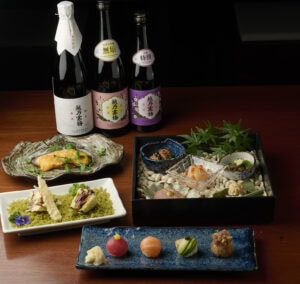Commentary on the current situation by Alexander Reinelt, founder and CEO of SUSHIYA GmbH, October 21, 2020.
The catering industry has supported many measures in recent months - out of its own interest and out of public interest, and of course because it was ordered to do so. But now a point has been reached that is no longer comprehensible
The last weekend was again a whirlwind of emotions: employees and media alternate every few hours with the news that there would be a closing time - i.e. closure order - from 22h for eateries, other times it was interpreted as a bar stop at 22h. On Monday then in the late afternoon the certainty: yes, the guests are to be sent home at 22h.
Why is this so bad for the restaurant industry?
The restriction of serving alcohol - understood! The later the evening, the more sociable the round, the more careless possibly the handling of rules, distance rules, hygiene rules. One can understand such a restriction, even if one does not approve of it. No operating license for bars & clubs, because there is loud music and alcohol - it hurts, it hurts, you miss it, but it makes sense somewhere, is understandable. And it is also clear that in such a situation the countermeasures sometimes do not fit 100%ig and it comes to small "injustices" at the edge, because you can not perfectly balance all the orders and regulations for such a special situation from one day to the next.
Gastronomy, along with artists and the event industry, has already been a sufferer #1 under the Corona restrictions, because in the normal state it also brings people together quite significantly. But there is also the part of quality of life that gastronomy stands for and that may mean that two or four people sit together at the table and enjoy a delicious meal and perhaps a fine wine. There's still no question of losing control.
At our restaurant sansaro, for example, table occupancy has completely changed, we have about 30% less occupancy than normal even on good nights - on slow nights this has an even more dramatic effect because tables can no longer be assigned so flexibly (spacing rules, table sizes).
The catering industry should be a safe place and is happy to support infection control measures
As restaurant employees, we wear masks throughout the evening, we ventilate vigorously on a regular basis, we invest more in cleaning agents, heating costs, display stands, disinfectants and dispensers, and so on. And at the same time have significantly changed revenue opportunities. And fewer guests who come, out of caution or fear.
We support the previous measures gladly and from our own conviction - even a stop of the alcohol bar from 22h.
But why we should send the guests now at 22h sharp home, that does not understand us! Most catering like us has at 22h last kitchen order. We ourselves close at 23h sharp, because we want to comply with all working time laws and our team also wants to go home at some point after a long evening.
But if now the guests are to be thrown out at 10 p.m., this brings some wave-like changes with it. Because the guest must have eaten up beforehand, he wants to have a certain amount of time to do this in peace. And before they eat up, the chef must have made the meal and the waiter must have taken the order.
Second occupancy of the evening and thus earning capacity is cut up
In a dining restaurant like ours, there are usually two occupancies: once at 6:xx pm and once at 8:xx pm. This is even more important at a time when our seating is being reduced because we can no longer seat so many people next to each other. Those who, like us, tax their employees correctly and do not pay black money, also depend on two very well utilized occupancies, so that they can pay their salaries, taxes, health insurance, professional associations and everything else.
With a closing time of 22h, an extreme pressure scenario arises for the chefs: they have to work very quickly so that the guest has enough time to eat - because in the fine dining area, you don't quickly whip up hand-formed sushi or the crème de la chef after 5 minutes.
So it goes on with the service and at the end the guest, who can imagine that he still has 1 1/2 hours for the entire visit when he arrives at 8:30 p.m., so after ordering and waiting for the food he already has to think about leaving. This guest will certainly not order a nice bottle of wine or Japanese sake with the meal in order to drink it up with pleasure and in peace - even if in the end it comes down to the same time scenario and in the end we don't have any drunken reckless people, we have already noticed in the first few days that we are missing far more than "one fifth of the evening turnover" as Tim Mälzer recently overstated it on television. However, he was also talking about the time limit 23h instead of 24h, whereas the closet from 23h to 22h is even more decisive for the many normal, well-behaved dining restaurants.
How this regulation is supposed to help infection control is completely unfathomable. No one has even tried to explain it.
On the other hand, we as restaurateurs are confronted with employees of health insurance companies and tax offices who often do not work 14 working days per week like we do (sic!), but have weekends off as a matter of course and are not reachable by phone on Fridays from 12h onwards.
Does the state take responsibility for the restrictions imposed?
The contact persons for deferrals are sometimes very nice and understanding, but sometimes also grumpy-bossy and arrogant. Some are only half-time employees and some, like the lady from the health insurance company recently, are only in the office from 10 a.m. every day (until 4 p.m., not until 8 p.m.). But then we hear sentences like "That's your problem, you are legally obligated to ensure that the payment is received in our account on time" or "Insolvency is a tried and tested means of taking companies out of the market, in Munich everyone in the catering industry finds a job again straight away anyway". For such rates one should take on extreme workload, years of entrepreneurial risk and now in the Corona crisis make new debts to pay off everything well behaved?
If the catering trade is now so sharply restricted that the second, more important occupancy of the evening is cut without sense and many guests do not use the offer any more, then the state must meet on the other side or put on meaningful aid packages which help just as purposefully as the restrictions which hit the catering trade now the catering trade!
We cannot see any sense for the protection against infections in the fact that in a restaurant, which closes at 23h anyway and is currently not allowed to serve alcoholic beverages after 22h, the guests are thrown out at 22h.
On the contrary, experience especially in the area of young people, illegal parties, etc. shows very concretelyThe fact that a civilized, controlled going out in a restaurant, which is forced to comply with the regulations, can be much better from the point of view of infection control than if people now meet privately for uncontrolled celebrations.
Our guests are not drunk before 22h and do not become completely careless after 22h.
However, it means a massive crowding of the previous event or loss of guests and coziness.
Measures should be appropriate and - above all! - reasonable in terms of what they want to achieve, then they will also be accepted. But in this case, there is no benefit to be seen in the fact that guests in a restaurant, which is no longer allowed to serve alcohol after 10 p.m. anyway, are no longer allowed to sit down after 10 p.m. Nothing is gained by this. Nothing is gained by this. On the contrary, such measures lead to the fact that orders and their sense are questioned and also retrospectively the suspicion grows that not always everything could have been well-considered and appropriate. And that is a particular pity, because even when we ourselves were affected, we always considered the government's actions to be moderate, prudent and appropriate.
Closing time at 21h corresponds to half the turnover at almost the same cost - the flexibility and revenue sacrifice we demand must also be provided by the state in the same way
Should there now also be a closing time at 21h, a complete lockdown would be better for us. Because for one evening our cooks have to prepare such a variety of materials for hours that the short-time work in preparations can never make up for the loss of sales. For us, this means that we will be financially strangled again if the entire Munich society does not refrain from visiting restaurants and completely switch back to delivery service.
Such a crisis always presents us with new challenges, and in addition to all the personal and economic misfortune, such crises always offer opportunities for renewal and joint action. We are ready for this, and we can do it. But when such dramatic, infection control questionable measures as a gradual lockdown and gastronomic restrictions are taken in installments, then on the other hand, government agencies must also demonstrate the appropriate flexibility. And flexibility doesn't mean "take out a loan and pay later," because we can never recoup the revenue we're losing now, can't just charge double the price to guests who come now because there's no second occupancy. Tax offices and health insurance companies must be willing to waive at this point, just as we must for the common good.
PS: So that no misunderstandings arise: we consider the government's actions in Germany to be fundamentally correct and sensible, and are currently experiencing in the Corona crisis how valuable it is to live in Germany. We only consider the curfew at 22h or now even 21h to be unhelpful and at the same time economically fatal for us and other restaurateurs. A hard lockdown, as it is now announced for November, we can even better support as a restaurant sansaro, because we can also plan with it and of course rely on our sushi delivery service in Munich can concentrate on. But if the hard lockdown is now coming, then it is all the more true that the state must also provide solutions. Read a Commentary in the Süddeutsche Zeitung.





